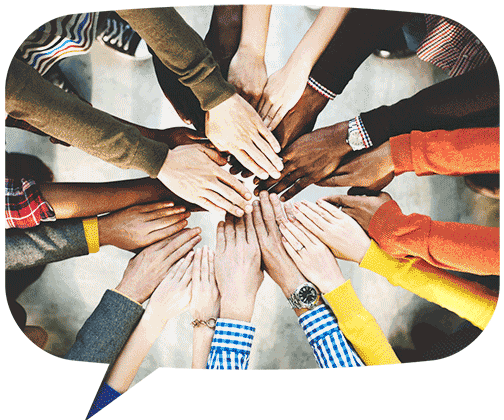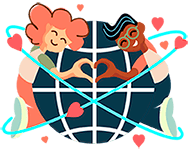
Create the life you want with
Nonviolent Communication (NVC)
- Experience more enriching relationships
- Resolve inner and outer conflicts
- Listen with compassion
- Express yourself fully

What Makes NVC Academy Unique?

Worldwide NVC Learning Hub
Professional and consistently excellent, NVC Academy has a long history woven with collaboration, connection, inclusion, and sustainability.

Online Academy for Learning NVC
Offering live courses, self-paced courses, downloadable courses, and over 1,200 NVC Library resources— we offer the largest variety of topics and trainers on the web today.

Global CNVC Certified Trainers
This wide range of perspectives, experiences, professional backgrounds, focus areas, and training styles cannot be found anywhere else in the world!
Live NVC Courses Starting Soon
Expand your NVC toolkit with a Live Course
Courses for all experience levels
Direct and personal connections with trainers
A wide range of topics to choose from
Lifetime access to recordings and handouts
Practice in real-time for deeper integration!
The Art of Communication: Manifesting NVC in Your Life
- Yoram Mosenzon
- Yoram Mosenzon
- May 02, 2024
Parenting with Purpose: Aligning Values with Actions
- Roxy Manning
- Roxy Manning
- May 08, 2024
Learn to Recognize and Manage Reactivity
- LaShelle Lowe-Chardé
- LaShelle Lowe-Chardé
- May 28, 2024
Participants Speak


NVC Academy's NVC Library is a banquet of riches, a sustaining resource for learners and practitioners.


The trainings available through the NVCA give me an opportunity to listen and learn without travel expenses. There are also times where the thought of zoom (cameras and break out rooms) can be simply overwhelming for me. Having an opportunity to watch videos and hear audio recordings has brought so much joy to have a choice in my learning format. I can imagine others that experience neurodivergence, social anxiety or time constraints could really appreciate this option.


Having access to the NVC Academy library is such a vast gift to me. I am honestly in both a state of overwhelm and great comfort in knowing I can continue at my own pace, troving through these immeasurable treasures which keep on giving toward quality of life.


The NVC library is a treasure chest. The recorded calls and classes have kept me company through many hours of driving, waiting in lines, and washing dishes at the kitchen sink. My relationship with my children has been enriched by the nuggets and gems I've picked up at the NVC media library.


Having worked with the NVC Academy for over 5 years as a candidate and then a new trainer, I recall how nourishing it had been for me to be exposed to different teaching styles and ways to bring NVC into the world. I often encourage the NVC practitioners I engage with and the CNVC candidates I serve to enroll in the NVCA Library.


The Library at NVC Academy is a treasure-trove of resources! No matter what your learning needs may be, you'll find just what you're looking for! And you'll also be enriched by unexpected gems that you discover as you explore the vast catalog of trainers and topics. What abundance! I recommend this to all of the trainer candidates I support.


There is an immense rich source of wisdom in this library-world, where I can travel to several destinations of nonviolence, get nourished according to the needs of my soul and share with my community all that I’ve integrated.
Free Resources For You To Try Now!
Our NVC Library
The Most Comprehensive Resource for NVC Training
 $15 billed today and monthly on the same date
$15 billed today and monthly on the same date Automatic renewal
Automatic renewal Cancel anytime
Cancel anytime Unlimited Access
Unlimited Access
 $150 billed today and annually on the same date
$150 billed today and annually on the same date Saves $30 per year over monthly payments
Saves $30 per year over monthly payments Automatic renewal
Automatic renewal Cancel anytime
Cancel anytime Unlimited Access
Unlimited Access
NVC Library
The Communication Difference: Create the Life and Work you Want
Yoram Mosenzon shares an exercise and demo to explore the process of identifying observations and using judgements (jackals) to find the needs. Keywords: Yoram Mosenzon classical NVC exercises/practices jackal show observation judgment empathy...
- Yoram Mosenzon
- Yoram Mosenzon
Guided Dialogue: A Structured Approach to Conflict Resolution
In this snippet from Duke Duchscherer's course, Restorative Dialogues: Transforming Conflict, Building Community Resilience, he shares a structured approach for conflict resolution or communication facilitation. It involves a facilitator guiding a...
- Duke Duchscherer
- Duke Duchscherer
Embracing Positivity: Transforming Lives through Joyful Choice and Conscious Action
Marshall Rosenberg used to talk about every situation with the same level of joy a child might feel. This may seem impossible at first! But when you focus on all the ways something is hard, you miss out on the full experience and remove your sense of...
- Mary Mackenzie
- Mary Mackenzie

World unrest statement
December 2023The world is grappling with what seems like an ever-growing number of conflicts. And my heart is heavy with despair at the impact this has on the numerous innocent civilians who find themselves caught in the crossfire. I recognize there are layers of unmet needs at the core of these conflicts. And while I stand by the Nonviolent Communication position to be firmly rooted in caring for all people and all of life, sometimes I struggle with it.
World unrest statement
December 2023
The world is grappling with what seems like an ever-growing number of conflicts. And my heart is heavy with despair at the impact this has on the numerous innocent civilians who find themselves caught in the crossfire.
I recognize there are layers of unmet needs at the core of these conflicts. And while I stand by the Nonviolent Communication position to be firmly rooted in caring for all people and all of life, sometimes I struggle with it.
The Nonviolent Communication community encourages understanding and empathy, even in the most challenging of circumstances. Often this takes the form of supporting all sides, understanding that each party in a conflict has its own needs that it is trying to meet.
Sometimes we can be so busy trying to understand all sides that we forget to be for something. And the desire inside me to openly show my support for some more than others is growing. I ask myself: How can we - as individuals and as a community - stand for something without inherently standing against something else?
As a community, our stance is clear: We believe in treating all people with the utmost care and respect. We stand for dignity and grace for everyone.
And there are specific groups that face particular struggles. That is not to say that the needs of all people do not matter - they absolutely do. Yet we are acutely aware of the horrific realities such as rape, abuse and human trafficking that disproportionately affect women and children in conflict zones.
At the NVC Academy we strive to create a world where every voice can be heard, every pain acknowledged, and every need addressed with compassion and integrity. It does not mean we always support the strategies taken by some in their attempts to meet their needs.
As we all navigate these challenging times, we remain rooted in our hope that we, as humans, connect with our deepest universal human needs and make choices that support peace, harmony, connection and healing. We are grateful to be part of communities who are working towards peace and supporting those who are suffering through these incredibly difficult times.
Mary Mackenzie
CEO, NVC Academy
CNVC Certified Trainer
Support for Humanity: A Statement on Russia and Ukraine
Thursday, May 5, 2022 (Updated on Friday, August 19, 2022)
The NVC Academy is mourning the great suffering of the peoples of Ukraine as a result of an armed attack by the Russian Federation on a sovereign, independent neighboring state - Ukraine. These attacks came by air, land, and sea, and involved attacking people, including civilian men, women, and children; damaging, destroying, and looting homes, hospitals, schools, churches, other community buildings, businesses, farming installations, machinery, crops, and other infrastructure and resources; and damaging or extinguishing the lives and habitats of other living beings in Ukraine. We mourn, also, the suffering of others elsewhere in the world, including in Russia, that has arisen from the choices made.
We are also mourning that we have not written similar manifestos before in relation to other situations of war and crisis affecting other regions. We are still choosing to do this, to start somewhere and move towards increasing our capacity to take such risks over time.
Space for Mourning Observations of War
What we hear about the conflict fills us with shock, anguish, and grief. For example, according to the Council on Foreign Relations:
- By December 2021, more than 100,000 Russian troops were stationed at the Russian-Ukraine border.
- On February 24, 2022, while the United Nations Security council met to dissuade Russia from attacking Ukraine, Russian President Vladimir Putin announced the beginning of a full-scale land, sea, and air invasion targeting Ukrainian military assets and cities.
- By late March, observers estimated that more than 90% of Mariupol had been damaged or destroyed by Russian bombardments.
- By April 29, 2022, there were 2,685 civilian casualties and more than 4.1 million refugees had fled from Ukraine.
Reports from other sources include that as of May 3, 2022, at least 220 Ukrainian children had been killed and at 406 children were injured. In addition, Russian soldiers were witnessed raping girls and women; some of these girls and women died as a result of the soldiers' actions. Mass graves have been discovered in areas occupied by Russian soldiers, including in Mariupol and the Kiev area. In Bucha, citizens were shot in the back of the head and were found with their hands tied behind their backs. There are photographs of Russian military vehicles that displayed the sign of the Red Cross containing munitions. These are a few examples of the violence and infractions of international law that have been reported.
We recognize the importance of trying to be objective and clear, and know that, in war, it can be especially challenging to know what is happening. We remain open to new information.
Support for Protection and the Alleviation of Suffering
The NVC Academy recognizes that, when opportunities for open dialogue that hold the needs of both sides in full do not exist, protective use of force may be warranted to protect life. We understand the choice of Ukrainians to resort to protective use of force under the current circumstances. We also recognize that no doubt, for at least some, their response to the Russian invasion does include enemy images and a desire to harm. There are two potential dangers that we see could be disturbing by developing enemy images: One extreme is the risk of a surge of unconstructive hatred. The other extreme is indifference and inaction in defending their country, people, land and property. We bring compassion and tenderness to this choice, recognizing the extreme circumstances the Ukrainian people are living with, and knowing it's not ours to tell those who are harmed how to respond.
We express our heartfelt hope that the citizens of Russia will call upon their government to cease their military operations in Ukraine so that peace can be restored. We also recognize that many have done so, at great risk to themselves, and that thousands have been detained and suffer consequences to their courageous willingness to stand up to the government.
We recognize that the pain is deep and that much aid will be needed now, and in the future to support ongoing healing for all parties, Ukrainian, Russian, and others.
We request that members of the Nonviolent Communication (NVC) community and individuals, groups, and organizations around the world pause to connect with their deepest human values and compassionate intentions. From this place, take specific, positive steps to contribute to the short- and long-term wellbeing of all those affected by the war in Ukraine, including sharing the values of independence and territorial integrity of Ukraine and supporting them in resisting Russian forces by providing moral, financial, defense, and political support from democratic governments and people across the world.
It is our hope that we, as humans, connect with our deepest universal human needs and make choices that support peace, harmony, connection, and healing in the spirit of awareness, self-responsibility, and choice, and in keeping with our sense of integrity.
The NVC Academy recognizes that those who have suffered may well, in their raw anguish, be experiencing strong emotions including hatred toward Russian aggressors. We invite you to offer empathy and support and to hear the severity of their pain.
While it is extremely painful to accept that fellow humans can contribute to such suffering, we strive to hear and acknowledge this pain so that those who have suffered or are suffering can be seen and heard. We hope that by offering our empathic presence, we can support healing.
The NVC Academy wishes to thank everyone who is working towards peace and supporting those who are suffering in this incredibly difficult time. Each of your contributions, financial and otherwise, are appreciated and give us hope for our shared humanity and faith in long-term peace.

Mary’s letter from Growing Roots
April 2024
Hello! It’s been a few months since I’ve had the pleasure of writing to you and I’m excited to check in. (...) I’ve been thinking about the NVC process of empathy lately for a variety of reasons, partly because I don’t hear people talking about it much these days and I’m curious about that. I think empathy is magic!! Listening for feelings and needs can transform rage into openness, deep sadness into clarity or relief, hurt into connection... in a heartbeat. The skill of it needs to be learned, and once we become comfortable with it, we can take it...










